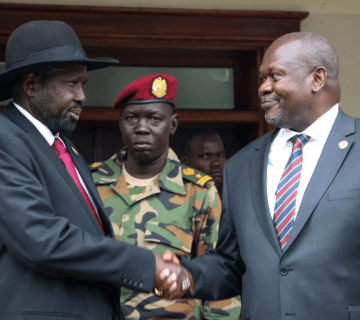On December 30, 2018, the Democratic Republic of the Congo (DRC) held presidential elections. These elections, in which the DRC’s incumbent president Joseph Kabila will finally leave office after his constitutional term ended in 2016, signal a handover of power to the opposition. Felix Tshisekedi was reported by the Commission Electorale Nationale Indépendante (CENI) to have received around 38 per cent of the vote, while another opposition candidate, Martin Fayulu, is said to have received around 34 per cent. The electoral outcome sparked unrest in parts of the country, especially in the eastern provinces of North and South Kivu.
The elections were marred by irregularities. Jason K. Stearns, an expert in the DRC and author of the book Dancing in the Glory of Monsters: The Collapse of the Congo and the Great War of Africa, has argued in an enlightening piece for the Congo Research Group that preliminary results from both CENI and the Catholic Church show a significant majority for Martin Fayulu, with respectively 59.42 per cent and 62.80 per cent of the vote. Stearns has acquired two data sets through leaks, one from CENI and one from the Catholic Church, and has rigorously scrutinized both to ensure credibility.
Additionally, the Catholic Church, a powerful organisation in the DRC which had fielded almost 40,000 observers throughout the country, stated that its results contradict CENI’s. Logically, both Stearns’ comments and the Church’s remarks have sparked unrest in the DRC, especially in opposition territories.
Next to unrest caused by the outcome of the elections, the run-up also spawned significant unrest. In the normally peaceful western area of Yumbi in Mai-Ndombe province, the run-up to the election fed into existing ethnic tensions. These tensions are alleged to have escalated after commotion over the burial of a tribal chief. The United Nations Refugee Agency (UNHCR) reported that around 16,000 people had fled Yumbi territory by crossing the Congo River into neighbouring Republic of the Congo. The UN further reported that around 900 people have been killed in just over three days during the clashes. The attacks took place between December 16 and December 18, 2018. Due to the violence, the December 30 presidential elections were postponed in Yumbi territory. While the bloodshed was not directly related to the presidential elections, a local activist told Reuters that ethnic tensions had escalated partly due to the Batende supporting the ruling coalition, while the Banunu supported opposition candidates.
Ethnic tension and subsequent clashes such as these were and still are common in the DRC. For example, in the 1990s, during and in the run-up to the Congo Wars, ethnic Banyamulenge in eastern DRC were seen as foreigners instead of Congolese, and subsequently targeted. Justin Semahoro Kimenyerwa, a survivor of ethnic clashes between the Banyamulenge and other ethnic groups, told The Huffington Post that “…unprovoked hatred of the Banyamulenge people has been the cause of indescribable suffering and massive killings of my people.” The Banyamulenge, in turn, set up self-defence groups targeting other ethnic groups in South Kivu, and joined the Rally for Democracy (RCD) rebel movement, committing abuses against non-combatants. In eastern DRC, various of these self-defence groups, or Mai-Mai, continue to operate to protect their own ethnic communities against aggression from other ethnic communities, rebel forces, and the DRC’s national Army (FARDC). Furthermore, in 2009, ethnic clashes between the Inyelle and Manzaya in the western Equateur province led to displacement of around 200,000 people and the death of around 200 to 500 civilians.
Jacob Bercovitch and Karl Derouen Jr., two well-known scholars on managing ethnic conflict, argue in their article Managing Ethnic Civil Wars: Assessing the Determinants of Successful Mediation that mediation offers more promise of success than most other conflict management techniques. However, even with mediation, the context of the conflict significantly matters to the success of conflict management efforts. Ethnic civil conflicts are often considered among the most difficult and complex conflicts to solve because they spawn more violence than most other conflicts. De-escalating or resolving such conflicts requires significant resources and time, and adequate conflict management techniques.
In the middle of current electoral turmoil, it is unlikely that the government of the DRC can devote enough resources, time, and adequate conflict management to quell ethnic tensions in Yumbi. The United Nations Organization Stabilization Mission in the DR Congo (MONUSCO), which is already present in large parts of the DRC, should take responsibility for de-escalating tension. MONUSCO’s primary goal should be to keep the peace, stabilize the area around Yumbi, and prevent further bloodshed. Additionally, UNHCR needs to assist the Republic of Congo in receiving refugees by distributing relief items such as food, water, tarpaulin for shelter, and other basic items. On the long-term, festering ethnic rivalry in Yumbi should be addressed through concerted reconciliation efforts by the government of the DRC and its international partners.
Jules Swinkels is a Visiting Research Fellow at the HORN Institute.



